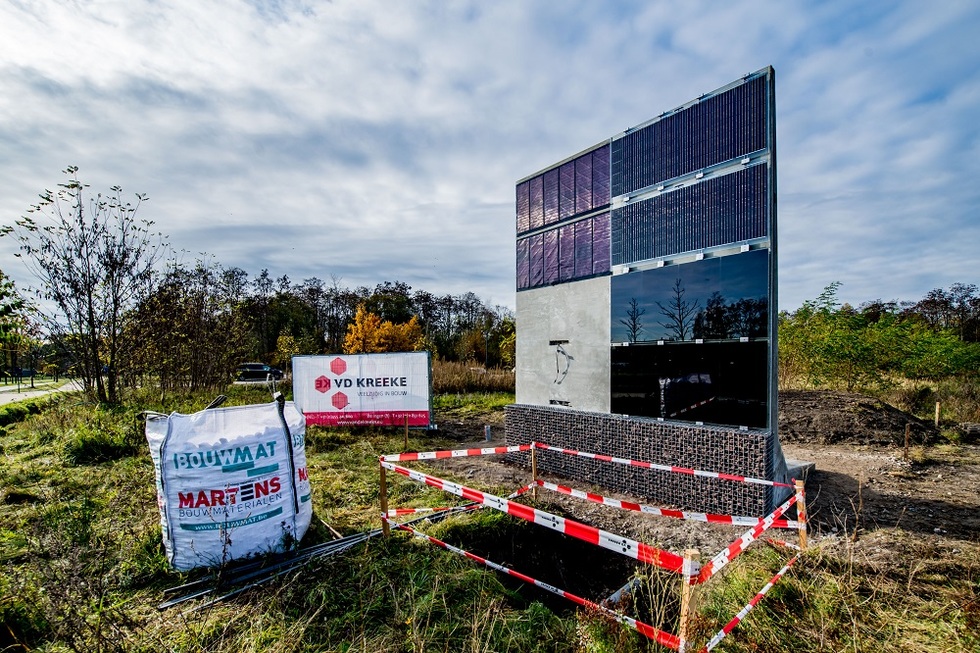Testing field for PV noise barriers

Two testing facilities for photovoltaic noise barriers are being built by a Belgian consortium. Their creators want to assess different PV technologies, reduce costs and plan large scale projects in Belgium, where land and policy constraints make the construction of ground-mounted PV plants almost impossible.

EnergyVille, a joint venture between the Belgian research institute KU Leuven, VITO, and imec, and Hasselt University, are building two test installations for PV noise barriers in Genk and Rosmalen.
The two testing facilities are part of the Rolling Solar project, which is aimed at developing new large scale, solar-equipped noise barriers and retrofitting existing noise barriers with PV technology, while also assessing the costs of this emerging technology.
One of the two installations, which is 13m wide and 5m high, is still under construction but is already being used for its first measurements. It is located at EnergyVille’s Thor Park in Genk, is south-oriented and is currently hosting solar panels relying on three different cell technologies: monocrystalline PERC modules; thin-film panels based on cadmium-telluride (CdTe); and solar modules made of copper, indium, gallium and selenium (CIGS), which were provided by Dutch consortium TNO/Solliance. All the panels are equipped with power optimizers from Israel-based inverter and storage system maker Solaredge.
“It won’t be long before the remaining eight meters of noise barrier will be realized by our new project partner Group Ceyssens, a developer and producer of windows,” EnergyVille said in a statement. “This section will consist of metal frames, in which CdTe and CIGS-solar-cell modules, and bifacial crystalline silicon PERC solar cell modules, are slid.”
The modeling for the energy yield was developed by imec scientists. It is expected to provide data on frequent shadowing caused by clouds and passing cyclists or cars, as well as efficiency and stability data related to solar module power generation. “SolarEdge’s power optimizers have a sample time of about 10 minutes,” EnergyVille further explained. “We want it to be one minute or less.”
Solar noise barriers are described as an ideal solution for Belgium, which has land and policy constraints for the deployment of ground-mounted PV. These barriers, however, should still have the primary function of reducing noise, and include some transparent sound-absorbing material placed over the solar panel. The material used so far, EnergyVille explained, has caused a 30% loss in energy yield on modules tested in the laboratory. “Construction and infrastructure company Habenu-van de Kreeke, the project partner that installed the pilot plant in Genk, is, therefore, now working on the development of new translucent material, together with a subcontractor,” it also stated.
The consortium is now in talks with the City of Antwerp and Bruxelles Environnement, the public service responsible for the environment and energy in the Brussels-Capital region, for the potential deployment of new noise barriers.
The same group of research institutes has already developed a pilot PV-integrated noise barrier together with Netherlands-headquartered construction firm Heijmans, which has a plan to build a total of 68 solar noise barriers in its homeland. “The test set-up is 12m wide. A total of five cassettes of 1m high each, in which solar cell modules are incorporated, are stacked on a concrete plinth,” EnergyVille said. “The two lower ones contain two-sided crystalline silicon solar cell modules. The upper one is equipped with thin-film CdTe solar cell modules [and] the middle two with double-sided thin-film CIGS solar cell modules.”
Prior to this project, Heijmans participated in a field study that demonstrated that the use of solar noise barriers on roads and railways could be an effective way to generate electricity.
From: https://www.pv-magazine.com/2021/07/19/testing-field-for-pv-noise-barriers/

